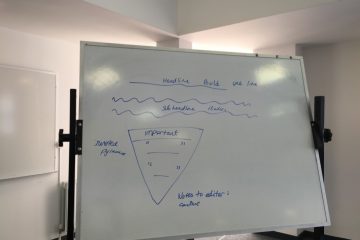So, you’re a journalist or you’d like to be a journalist and you’re looking for work? Here’s something I wrote couple of years ago first and have updated as a blog post.
If you want to move out of print or are looking for a full-time job which will involve in using writing and editing skills have a look at job descriptions for roles with titles like ‘content editor’, ‘online editor’, ‘copywriter’, ‘digital content writer’ and so on.
You will find these on many job websites. You know the usual ones.
Look at the job descriptions and see how you can match your existing skills and experience to what’s required. Feel somewhat intimidated? Then make a list of the things you don’t know. Because you’re going to have to teach yourself. I will bore you to death if I try and give you a course in writing for the web.
Some of the things you need to know
CMS
A popular one for many people is content management systems (CMS). My advice is to set up a WordPress.com blog. If you’re shy, create a private one. You can try teaching yourself but my advice would be RTFM – read the advice section first. Then practice a lot. You will need to know how to format text, use headings, hyperlink, add photos and meta data.
SEO
SEO is a word you will hear about a lot. So learn what you can. It stands for search engine optimisation. Useful resources include: The beginners guide to SEO from the SEOMOZ website SEO Starter Guide from Google (PDF) (2010)
Photos
You will also need to know how source and to edit photos. You can’t resize every photo automatically. You’ll have to crop them to ensure they don’t look squashed looking and then resize the right dimensions. Google this.
Where to source photos can be an issue. If you’ve a budget your employer will likely have a company account for stock photography.
But others often source really creative photos for free from Flickr – but only ones that have a Creative Commons license.
Social media
Understanding social media is a basic in this industry. Get to grips with it. Use the how to sections and pick up tips along the way. If you don’t yet have a ‘digital footprint’ you need to start building one.
Set up a LinkedIn profile and fill it out fully. Connect with people you know.
Start using Twitter – don’t just start following celebrities but engage with real, live people. Or get the news or good reading material from it.
Set up a Facebook account if you don’t already have one and set up some sample business pages – you don’t even have to make them public, but you could get asked if you have experience in it at a job interview.
Get hooked on Instagram, you can have a bit of fun uploading and sharing photos even if it’s never of use on the job front.
Keep learning
Find out about courses and meetups that relate to journalism or social media. Sign up for something that fits your schedule, budget and meets your objectives.
Read
Read offline stuff. Find books on Amazon that are related to your field of interest.
Listen
Find podcasts to listen to.
Based on a draft from 2012.


